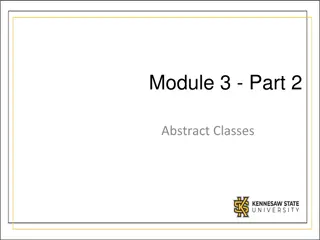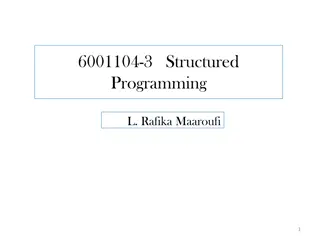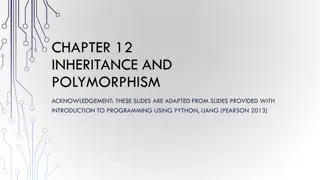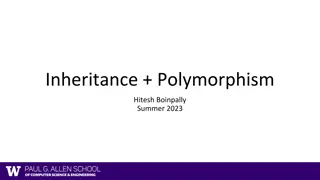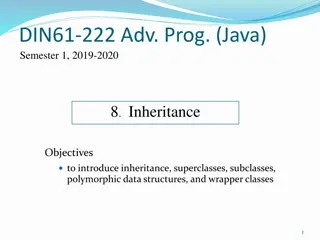Understanding Abstract Classes and Inheritance in Object-Oriented Programming
Inheritance in object-oriented programming allows for reusing proven and debugged high-quality software through abstract classes. Abstract classes serve as superclasses and cannot be instantiated, instead, they force child classes to implement specific methods. Concrete and abstract methods can coex
6 views • 15 slides
Understanding Inheritance in Object-Oriented Programming
Inheritance in Java is a key concept where a subclass can inherit properties and behaviors from a superclass. This mechanism allows for hierarchical organization and the creation of modular classifications. The relationship between superclasses and subclasses is crucial in defining object-oriented d
4 views • 19 slides
Understanding Inheritance and Polymorphism in Python
Exploring the concept of inheritance in object-oriented programming, specifically in Python, to create a hierarchy of classes where subclasses inherit attributes and methods from a superclass. This approach helps to avoid redundancy and promotes code reusability. The relationship between superclasse
0 views • 11 slides
Understanding Object-Oriented Programming (OOP) in Python
Object-Oriented Programming (OOP) is a programming paradigm that focuses on organizing code into objects with attributes and behaviors. Python supports various OOP concepts such as classes, objects, inheritance, polymorphism, abstraction, and encapsulation. Classes serve as blueprints for creating o
0 views • 29 slides
Understanding Inheritance and Polymorphism in Object-Oriented Programming
Inheritance allows classes to form hierarchical relationships, facilitating code sharing and reuse. Superclasses are extended by subclasses, which inherit their behavior. This relationship creates an "is-a" connection, such as Tiger extending Cat. Polymorphism, demonstrated through a set of classes
0 views • 11 slides
Introduction to Inheritance and Polymorphism in Java Programming
This course material covers the concepts of inheritance, superclasses, subclasses, polymorphic data structures, and wrapper classes in Java programming. It introduces the DoME example - a multimedia entertainment database, showcasing the implementation of classes like CD and DVD. The details of CD a
0 views • 54 slides
